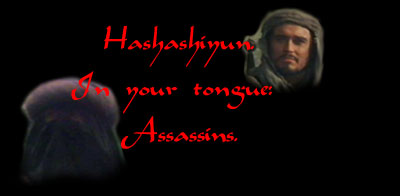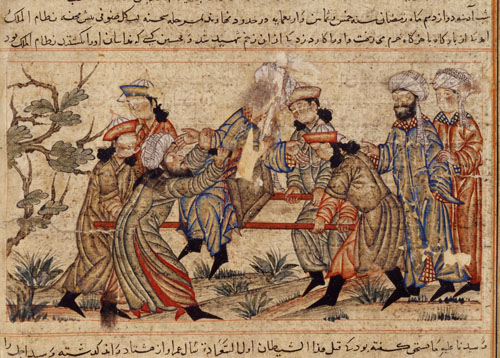 |
 |
"Old Man of the Mountain"Netanyah 14th-century painting of the assassination of Nizam al-Mulk by an assassin. Throughout the later centuries, however, the Assassins became hired, secret murderers, of a peculiarly skillful and dangerous kind. Although they were known as among the hazards of the East, they were not explicitly connected with any particular place, sect or nation, nor ascribed any religious beliefs or political purposes to them. They were simply ruthless and competent killers and must be guarded against as such. As Lewis notes in his book, "The Assassins: A Radical Sect in Islam," by the thirteenth century, the word Assassin, in various forms, had already passed into European usage in the general sense of hired professional murderer. The Florentine chronicler Giovanni Villani, who died in 1348, tells how the lord of Lucca sent "his assassins" to Pisa to kill a troublesome enemy there. Even earlier, Dante, in a passing reference in the 19th canto of the Inferno, speaks of "the treacherous assassin"; and his fourteenth-century commentator Fancesco da Buti, explaining a term which for some readers at the time may still have been strange and obscure, remarked: "An assassin is one who kills others for money." Since then "assassin" has become a common noun in most European languages. It means a murderer or, more particularly, one who kills by stealth or treachery, whose victim is a public figure and whose motive is fanaticism or greed. Of course, as Lewis notes, it was not always so. The word first appeared in the chronicles of the Crusades, as the name of a strange group of Muslim sectaries in the Levant, led by a mysterious figure known as the "Old Man of the Mountain", and abhorrent, by their beliefs and practices, to good Christians and Muslims alike. One such report quoted by Lewis, of an envoy sent to Egypt and Syria in 1175 by the Emperor Frederick Barbarossa, states that "this breed of men live without law; they eat swine's flesh against the law of the Saracens, and make use of all women without distinction, including their mothers and sisters.... They have among them a Master, who strikes the greatest fear into all the Saracen princes both far and near, as well as the neighbouring Christian lords." This "Master" or "Old Man of the Mountain" had struck the imagination of much of Europe so much so that, at one time, he became an anecdote for undying devotion in love and romance. "You have me more fully in your power," says a Provencal troubadour to his lady, "than the Old Man has his Assassins, who go to kill his mortal enemies...." "Just as the Assassins serve their master unfailingly," says another, "so I have served Love with unswerving loyalty." In time, however, it was murder, rather than loyalty and devotion, that made the more powerful impression, and gave the word assassin the meaning that it has retained to the present day. In modern times, however one prefers to call it - "patriotism", "self-defense", "self- sacrifice", take your pick - the fact remains that from the very first time the Heysessinis struck, murder would be committed for a political purpose, of removing a non-combatant political enemy. And, perhaps the most unfailing would be those steep in some religious belief, so much so that the assassin would chance even death in order to complete his task. Lewis clearly notes this in his book, whereby a German chronicler Arnold of Lubeck was said to have written, "I shall now relate things about the Elder... which appear ridiculous, but which are attested to me by the evidence of reliable witnesses. This Old Man has by his witchcraft so bemused men with such hopes and with promises of such pleasures with eternal enjoyment, that they prefer rather to die than to live. Many of them even, when standing on a high wall, will jump off at his nod or command, and, shattering their skulls, die a miserable death. The most blessed, so he affirms are those who shed blood of men and in revenge for such deeds themselves suffer death." Skip several centuries ahead, the parallels with the failed assassination attempt by two Mosad agents of Khaled Mishal, a leader and spokesperson of Hamas, is astonishing. Steeped, perhaps, in the fanatical belief that the land of Palestine belonged solely to the Jews, the two Mosad agents, disguised as Canadian travelers, set out to accomplish the sort of task which, to this very today, is considered "terrorism." Upon injecting Khaled Mishal with a special poison, they quickly fled but was soon captured by Mishal's body guard with the aid of the Jordanian police. With their being discovered as undercover Mosad agents, negotiations of prisoner transfers took place between the Jordanian and Israeli governments, and the rest, as we know, is history. However, what history has yet to record is the world coming fully to grips with the fact that Netanyahu had been acting like the "Old Man of the Mountain." Only he could dispatch those agents to commit the dastardl crime, by sending others to do his dirty work. And instead of denying it forthright, in response to the almost unrelenting international media coverage, Netanyahu remarked, "This is war; we will do whatever is necessary." Although there is scant coverage on the matter nowadays, the recent events of the US continuing to place sanctions on nations listed as state sponsor of international terrorism gives rise to a whole series of issues, not least of which is hypocrisy. According to Title 22 of the United States Code, Section 2656f (d), the term "terrorism" means premeditated, politically motivated violence perpetrated against noncombatant targets by sub-national or clandestine agents, usually intended to influence an audience. The term "international terrorism" means terrorism involving citizens or the territory of more than one country. Yet, no sanctions have been placed against Israel or any other action taken against the Tel Aviv regime in the same manner that has been done to nations like Lybia, Iran, Iraq, Cuba, North Korea and Sudan. This means that the whole existence of the US list of state sponsors of international terrorism is based mainly on political expedience. This is especially so when Sudan has been placed on that list regardless of whether or not the US State Department is able to furnish concrete evidence in support of its claim against Sudan. According to the State Department report responsible for the inclusion of Sudan on that list, the 1993 Patterns of Global Terrorism, "Although there is no conclusive evidence linking the Government of Sudan to any specific terrorist incident during the year, five of fifteen suspects arrested this summer following the New York City bomb plot are Sudanese citizens." As ostensibly observed by ex-President Jimmy Carter, the Sudan had been listed without any evidence. "In fact, when I later asked an Assistant Secretary of State he said they did not have any proof, but there were strong allegations. I think there is too much of an inclination in this country to look on Muslims as inherently terrorist or inherently against the West." (The Independent, Sept. 17, 1993) Amazingly, according to the London based Sudan Foundation, the lack of evidence continues, but Sudan remains listed. In any case, the United States is the biggest supporter of Israel both politically and financially, and would probably continue to give support to Israel way into the future. Hence, it would not place Israel on the list of state sponsors of international terrorism, if only because the United States cannot place sanctions upon itself! Ahmad Faiz bin Abdul Rahman 19 November 1997. -----------------------------
|
 Webpage © 1995-2015 Isle of Standauffish |